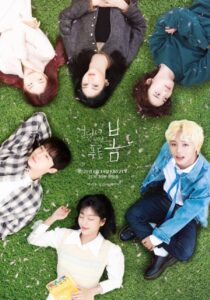
When KBS’ coming-of-age series At a Distance, Spring is Green began its run, all indications pointed to a refreshingly honest take on youth. The main characters led relatable lives, the issues they tackled were profound, and the drama’s unhurried pace and use of earthy tones evoked a naturalism that appeared to tie the whole thing together.
However, unable to sustain its allure, At a Distance eventually loses its footing, pushed down by an inability to even out its characterizations and balance lighter moments with darker themes. Ultimately, and rather disappointingly, the drama’s charming start is put to waste by clichéd, convenient resolutions.
One of the drama’s clear strengths lies in the characterization of wealthy but misunderstood Jun (Park Jihoon) and poverty-stricken Soo-hyun (Bae In-hyuk). At the risk of having an unlikeable lead, At a Distance doesn’t shy away from giving Jun a dark side. He can be manipulative at times, partly owing to the fact he was abused as a child, but Jihoon’s surprising combination of sweet and sinister makes for an unpredictable, complex character. Meanwhile, In-hyuk’s preternatural stoicism fittingly underscores his character Soo-hyun’s heartbreaking reality. From dozing off in class to passing out during one of his too many jobs, the gamut of Soo-hyun’s misfortune is effectively conveyed.
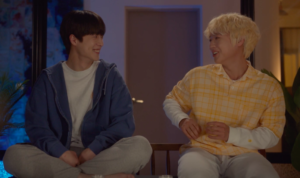
The writers did well to pit the two against each other as it is their fiery exchanges and obvious chemistry that really fuels the series. Whenever they lash out at each other, they reveal poignant truths about privilege and unhappiness, among other things. In one scene, an exhausted Soo-hyun shares, “Do you know what’s really miserable? Being so broke that you can’t protect those who are dear to you.” Jun replies, “Well, some of us have no one to protect, even if we have the money to do it.”
Unfortunately, So-bin (Kang Min-ah) doesn’t get the same in-depth treatment as her fellow leads, even though the foundation has already been laid for a compelling character. In the first half of the series, she often brings up feelings of mediocrity and uncertainty, even calling herself “pathetic” for not knowing what she wants. It’s also implied that her low self-esteem has to do with frequent bullying episodes in childhood.
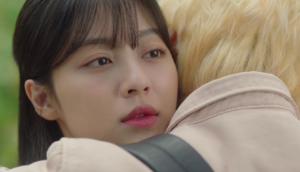
But after Jun forces her to confront her inner child mid-season (admittedly, a beautiful and tender scene), So-bin very quickly overcomes her fears. She gets together with Jun and just like that, even with six more episodes to go, her arc is complete.
Her inferiority complex barely gets a callback, as if it were magically resolved by the power of love. And despite being a mainstay of the drama, she doesn’t really do much throughout its run, except occasionally flash her newfound braveness. More often than not, though, she functions as the inflatable bag that receives Jun’s emotional blows, or else pushes him to sure-fire action. When she confronts her estranged mother in a later episode, it seems completely out of the blue—that is until she relates the experience to Jun, who now feels empowered to do the same with his own family. The scene is not so much an exploration of So-bin’s backstory as it is a jumping-off point for Jun’s.
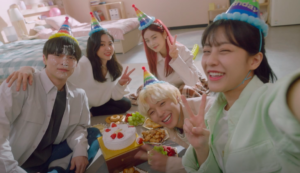
Secondary characters Young-ran (CLC‘s Eunbin), Mi-ju (Woo Da-vi), and Chan-ki (Choi Jung-woo) are equally interesting in their own right. But as with So-bin, the series doesn’t seem to know what to do with their overflowing potential, so instead, they are relegated to mere romantic interests with no inner lives of their own. Their presence seems decorative at best and disposable at worst. The three girls are roommates, yet all they ever talk about are boys. And Chan-ki mostly just pops up when Jun and So-bin’s all-too-perfect (and honestly, boring) relationship needs some friction to appear, well, real.
They are so discardable, in fact, that when Jun makes his rousing speech about youth in the finale, he shares the moment, not with this rag-tag group we’ve come to know for a whole season, but rather with his teammates/former tormentors. It is meant to be a stirring moment that shows how togetherness triumphs despite all odds, but it feels incomplete, if not entirely empty.
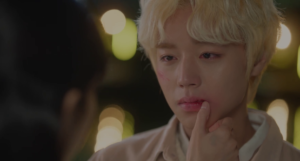
That’s why, despite the string of couples the series touts, it’s Jun and Soo-hyun’s relationship that truly stands out. It doesn’t subsist solely on love, although that is definitely there. In fact, there’s so much going on between them that it’s no surprise fans have shipped them as a pair. Indeed, their love-hate bromance, which culminates in them living together, is too palpable to ignore.
But while At a Distance gives so many hints of this possibility (anyone seeking signs of queer coding will have no problem finding them here), it ultimately isn’t brave enough to go where its BL source material goes, just as it isn’t brave enough to give So-bin and the others the complexity they deserve.
Apart from mishandling some of its characters, the series also seems to fumble the very serious topics it takes on, which includes abuse, anxiety, and suicide to name a few. Of course, it’s commendable for any story to bring up weighty and overlooked issues, but it then has a responsibility to depict them in earnest. Otherwise, it risks using these issues as mere decorations to seem “real” without actually having anything to express or hold onto.
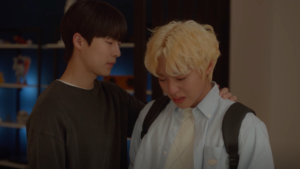
This is the line At a Distance treads. Sometimes, it manages to keep its balance, like when it gives Soo-hyun the dignity of a self-made man by full-heartedly depicting how he tries and fails to overcome his financial struggles. But for the most part, the drama seems disinterested in diving into the problems it poses.
For example, when Jun intentionally sabotages So-bin’s date for his own gain, it raises questions about the cycle of abuse and whether or not the pernicious actions of a victim warrant forgiveness. Instead of exploring this gray area, the drama goes down the romantic route and frames Jun’s manipulation as an act of lovelorn jealousy. Interestingly, even when they’re together, Jun repeats this toxic habit of lying to So-bin, albeit in milder ways, but So-bin just concludes that she must try to be more understanding of her troubled boyfriend.
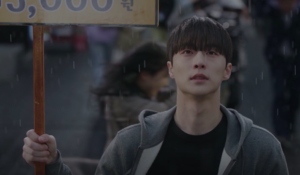
A darker and more glaring instance is when it is implied Soo-hyun attempts to take his own life. The scene is gut-wrenching, and it’s the first time we see him truly break down and admit his exhaustion. But in the next scene, before we can even process the gravity of what just happened, Soo-hyun is back with Jun, seemingly renewed. The drama’s sugary synthpop OST sweeps them into lighthearted territory, signalling that we’re supposed to be relieved that all is well.
The drama’s previous flirtations with suicide unfold similarly, like when Jun threatens to topple into a river after being beaten by his father. The moment feels painfully real, until he’s caught by So-bin and it ends up being a clichéd almost-kiss moment. Similarly, when So-bin is locked in a room and secretly filmed, the situation cartoonishly descends into a damsel in distress scene, where Jun barges in and saves the day. It presents no nuance or empathy, despite being a scarily common phenomenon in South Korea.
At a Distance is meant to be a story of trauma dotted with lighthearted moments to buoy it along the way, but sometimes it feels like the opposite, where the more serious moments are intermittent, and the fillers become the main show.
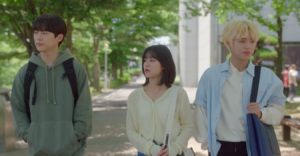
It’s still genuinely endearing in some ways. At its heart, it is, after all, a story about how three people blossom from strangers to best friends who help each other heal from the past, cope with the present, and move on to a brighter future. Unfortunately, this message is blunted by a heavy-handed approach to serious issues. The series preaches the acceptance of darkness, but it doesn’t seem to know how to do that itself. Its saving grace is the characters and the relationships between them, but that too is hit-or-miss, as it doesn’t seem to make full use of their potential.
Even in the crowded market that is youth-centered dramas, At a Distance had all that it needed to succeed. But by resorting to convention and triviality, the drama doesn’t so much stand out as it does float away, like a delicate, forgettable flower in the spring breeze.
(YouTube[1][2]. Daum. Pride.com. US Children’s Bureau. CNN. Images via KBS2.)


